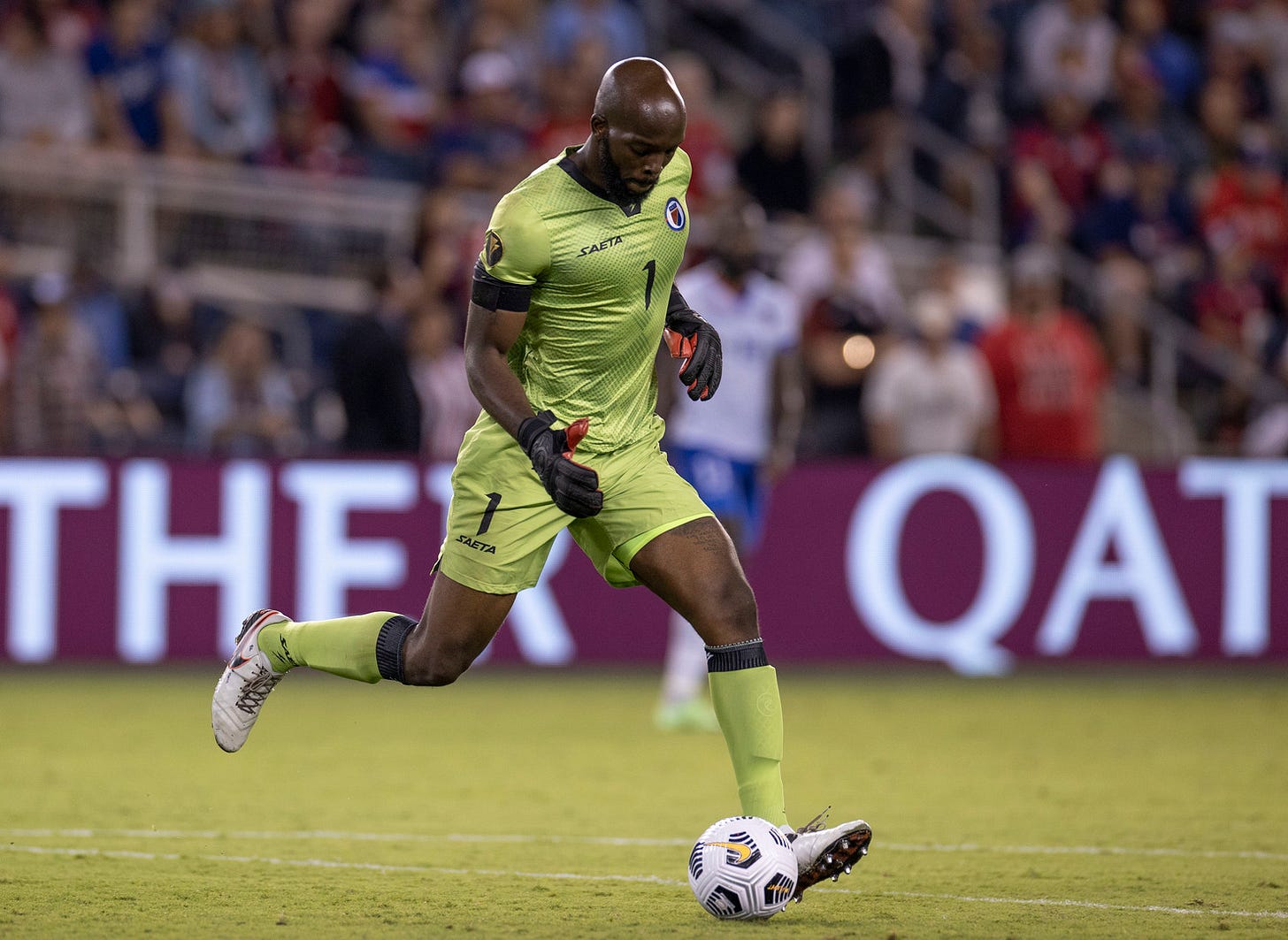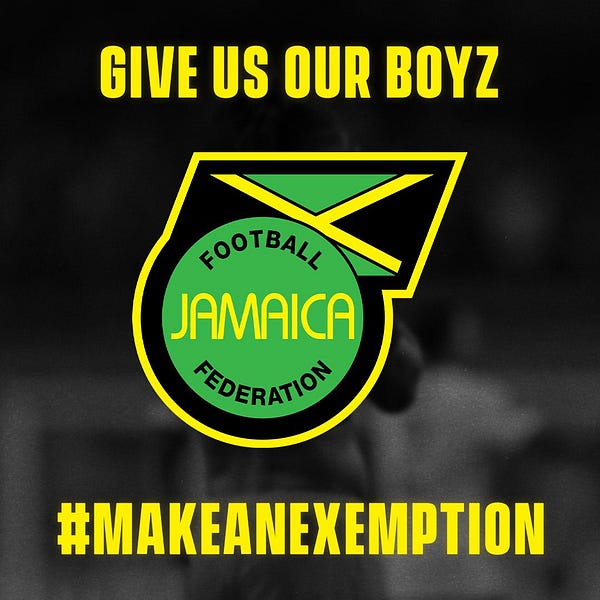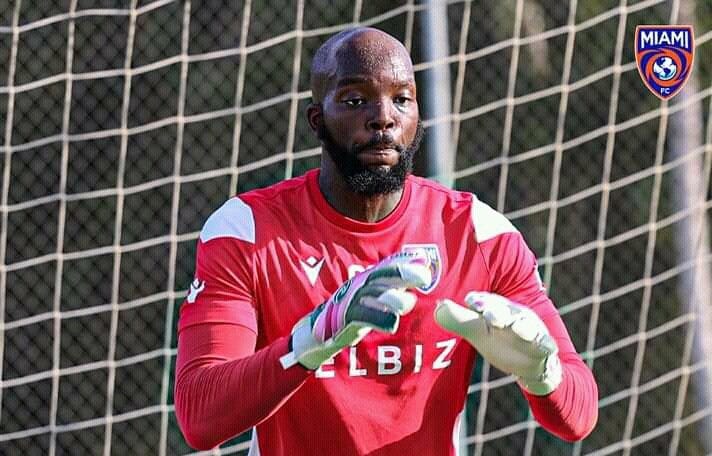🇭🇹 Meet the Florida-born goalkeeper who suddenly became Haiti's No. 1
Plus: Teams hope to select Europe-based players despite 'red list' battle
You should subscribe to get this newsletter in your inbox every time I write one. Just click below and follow the simple steps!

It hit Brian Sylvestre during warm-ups.
The country of his birth, in the top 20 of the FIFA ranking, was ready to open its campaign to win the continental championship with a big victory.
He was trying to stop them.
The U.S. put one goal past the goalkeeper, who started the year off the national team radar but unexpectedly became Haiti’s No. 1 for the Gold Cup after his teammates contracted COVID-19.
Sylvestre made his Haiti debut in a qualification round match against Bermuda. The next day, he found out he’d be facing off against the Stars and Stripes and started “counting the days.”
“When the day came, the Gold Cup experience was unbelievable,” he said, remembering the dramatic countdown before the opening whistle. “I was like, ‘This is game time!’ Trying to hold myself down, like, this is what I’ve been waiting for and you have to go out there and rock the best you can.”
Sylvestre hasn’t even been the regular starter at club level this season for Miami FC, a USL Championship club not far from his hometown of Hollywood, Florida.
While a red card and an injury cleared the way for his first appearances of the season this month, he’s been stuck behind first-choice keeper Connor Sparrow.
There were even more players in front of him with Haiti, but the situation shifted quickly. Sylvestre landed on the Gold Cup roster in part because longtime Haiti shot-stopper and captain Johny Placide opted to skip the Gold Cup after expressing frustrations with the federation during the second round of World Cup qualification.
France-based Placide didn’t know to leave Europe early enough to comply with regulations to later get into the U.S., where Haiti was playing Canada in the second match of a two-legged series to make the Octagonal. Several other players, their travel arrangements, they allege, set up by the federation, were in the same situation.
Placide’s replacement, Josué Duverger, went viral for a jaw-dropping own goal, but still was set to take the gloves in the tournament before he and Isaac Rouaud were ruled out of the tournament as a coronavirus outbreak took hold in the Haiti squad.
Suddenly, Sylvestre was the first - and only - choice.
“To be honest with you, it was tough mentally. We were getting tested so many times. It was like, ‘Wake up right in time for our morning COVID test!’” he said. “Obviously, when you have a certain number of players with COVID you wonder if the game is going to be able to go on, a lot of players are anxious for their moment. The day of (the game), we find out we’re going to play and have to get ready.”
Haiti managed a last-day win against Martinique despite having only one field player available as a substitute and domestic-based goalkeeper Alan Jerome, added late to the roster, also in the fold.
In addition to the virus issues, Sylvestre also said the assassination of Haitian president Jovenel Moïse during the tournament affected the camp, with some players who had met the politician in the past especially shaken.
But the tournament was a sporting success for Sylvestre. He’s on Haiti’s roster for September friendly matches against Bahrain and Jordan, with a goal of staying in the team for the long-term.
While he grew up in Hollywood and enjoys being from the U.S., Sylvestre said he’s also been deeply invested in his Haitian roots, speaking Creole,
“The culture and everything was was established and had instilled into me, so to represent Haiti, it was an honor,” he said. “I actually have a lot of family back in Haiti still, and they were calling my parents, saying they were proud of me.
“It was a big, beautiful moment. It’s crazy. It’s difficult to explain, but even now I get goosebumps talking about it.”
Being a national team starter may have been something Sylvestre dreamed of as a kid growing up in South Florida, but it’s a dream that looked to be dead. As he bounced between the top three divisions of North American soccer, with stops in Vancouver, Philadelphia, North Carolina, Los Angeles and Madison before his homecoming, Sylvestre also suffered multiple knee injuries that had him wondering if he’d ever play again with one knee surgery he described as “almost a career-ending knee surgery.”
The 28-year-old also has had his struggles off the field, losing family members on the island as Haiti continues to cope with many societal difficulties.
“What can we say? It seems like Haiti can never catch a break,” he said. “There’s always something. The earthquake, flooding, but what can we do besides stay strong and pray for the island?”
Sylvestre knows he can give just a little more, working to help the national team do whatever little bit a soccer team can to give Haitians, on the island and throughout the Americas, a little extra pride in their country and their team.
Rosters being announced as ‘red list’ battle rolls on
Will Raul Jimenez be able to play for Mexico in this World Cup window? What about Hirving Lozano?
Can Jamaica’s players travel for their game against El Tri?


It’s no accident those two countries with the most potential to lose are the last in the region to release their rosters ahead of September’s World Cup qualification final round matches.
We talked a bit this week in the premium edition of the newsletter, which comes out every Monday, about what the red list issue looked like for the region.
I’ll have more on that, plus overviews of all eight teams still alive in World Cup qualification, next week for premium subscribers. Sign up here so you don’t miss it:







